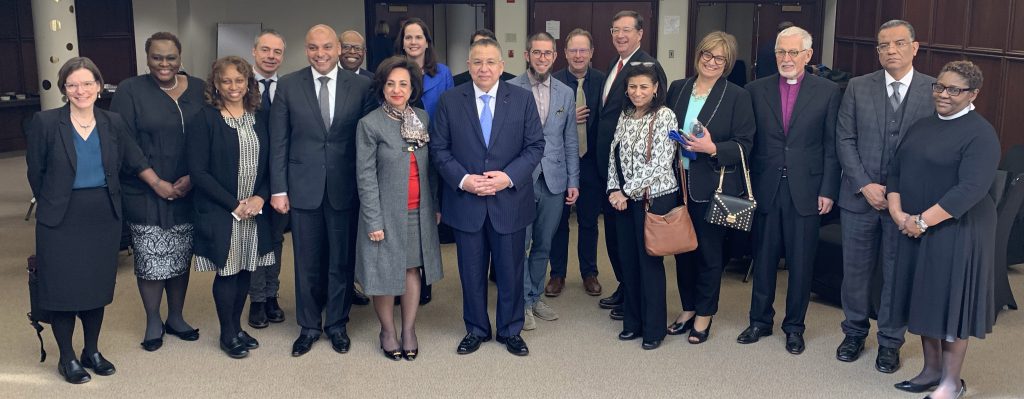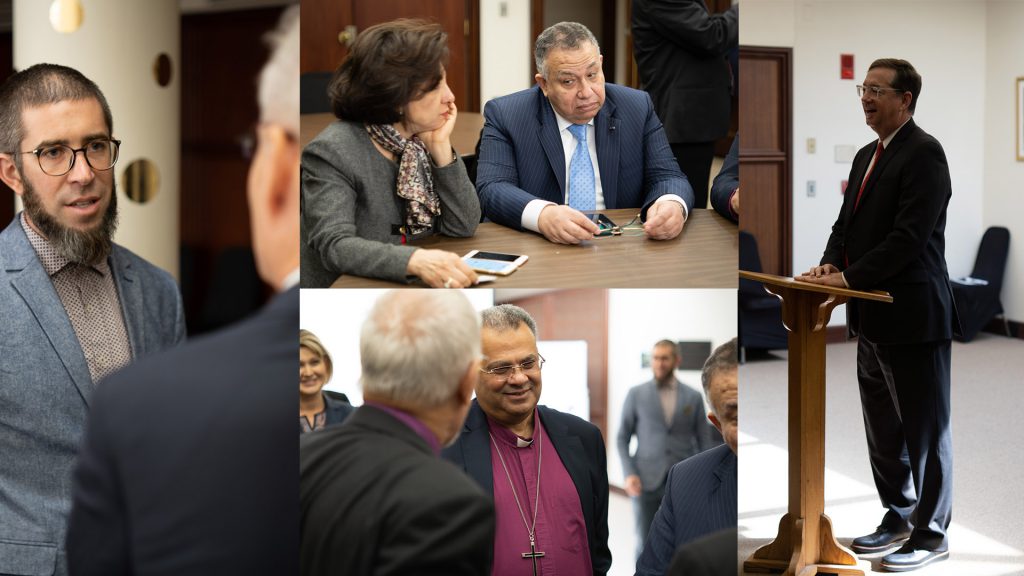For six years, a delegation of Egyptian faith leaders and government leaders has engaged with American faith leaders in a dialogue process that has taken place in both countries. This week, Rev. John Dorhauer, board chair of the National Council of Churches, delivered this speech to the dialogue while in New York. Rev. Dorhauer speaks in his capacity as General Minister and President of the United Church of Christ and as the chair of the NCC’s governing board.
Mr. Vice Speaker of Parliament, Honorable members of parliament, Rev. Dr. Zaki, Presiding Bishop Eaton, and all distinguished and honored guests, I consider it an honor to speak to you today on the subject of political and social developments in the US and the Church’s Witness within that context.

Compared to Egypt, we are a young country. All my life, I have been fascinated by Egypt, one of the cradles of civilization. It was one of the first cultures to develop concepts like writing, agriculture, urban centers, architecture, religion, and a central government. I have stood beneath your pyramids, traveled the busy streets of Cairo, eaten with delight your cuisine, and throughout my life enjoyed the many benefits or your rich culture and history.
We have much to learn from a people whose history and culture is as deep and complex as yours.
America is a great country with a government of, by, and for the people. We are proud of that. And we are aware that even at our best, we have failed to fully realize the ideals promised in our Constitution.”
Rev. Dr. John Dorhauer
Though young by comparison, we in the United States have much to be proud of. We are the world’s oldest existing democracy. Our constitution promises that all are created equal and are endowed with the inalienable rights of life, liberty, and the pursuit of happiness. We guarantee the same rights to all regardless of gender, race, or religious practice. We maintain a free press, and throughout our history have held free and fair elections every four years without once failing to complete a successful transfer of power.
But current political and social developments threaten America’s long-held commitments to these long-held constitutional ideals.
America has really delivered all that our Constitution promised, and throughout its history has tolerated gross abuses and injustices.
From the beginning, we normalized and profited from the enslavement of African peoples all the way back to the early 17th century.
We systematically and brutally caused the genocide of our indigenous peoples, reducing their population to a fraction of what it once was.
Women were denied the right to vote for the first 144 years of our democracy.
Following the Civil War and the emancipation of our slaves, blacks were systematically discriminated against, denied the right to vote, denied access to schools and education, lynched, and publicly humiliated over and over again.
During the Second World War, we created internment camps for US citizens of Japanese origin.
America is a great country with a government of, by, and for the people. We are proud of that. And we are aware that even at our best, we have failed to fully realize the ideals promised in our Constitution.
What our freedom has allowed us to do, though, is continually lift up voices of protest and challenge. From the abolitionist movement of the 18th and 19th centuries; from the suffragist, labor, and civil rights movements of the 20th centuries; to the Black Lives Matter and Me Too movements of the 21st century America continues to produce movements that challenge instantiated power and demand the freedom and justice promised by our Constitution.
At the heart of all of these movements can be found leaders from our faith communities. Ecumenical and Interfaith in nature and composition, for every injustice perpetrated in America there has been a rising tide of vocal, literate, and physical resistance. Rabbis and Imams and Pastors have always joined together to fight injustice and oppression. Today is no exception.
Today in America white supremacy is on the rise. Hate crimes are becoming more and more frequent. A new form of white supremacy tolerates mass incarceration of black and brown bodies, distributes wealth to whites at almost ten times the rate of blacks, and continually refuses to adopt laws to remedy these injustices.
We routinely demonize Mexicans and other immigrant and refugee communities. We not only accept the separation of refugee and immigrant children from their parents; we also practice the cruelty of confining those children in cages.
From the highest offices in our land, we hear refrains of xenophobia, old tropes of white supremacy, the degradation of women, a renewed fear and hatred of Muslims, and a profound and, quite frankly, disgusting characterization of the entire African continent as a cesspool.
There is a brand of Evangelical Christianity practiced in America today that tolerates these injustices. In some cases, it more than tolerates it as it serves to provide an ideological and theological framework to support it. Any religion in any culture can give rise to fanaticism and fundamentalism, becoming more a tool of discrimination and injustice than a source of healing, hope, and peace. America is not immune from that phenomenon as many of our political injustices find safe cover behind the teachings of fundamentalist Christianity.
America has become a fiercely divided country in which the political and religious right finds little to no common ground with the political and religious left. Both sides shout across the aisle at each other with no interest in joining their voices or their actions for a common good.

It is in this political and religious context that a growing interfaith movement is rising. Both the Evangelical Lutheran Church in America and the United Church of Christ are a part of it. We join a great cloud of witnesses who have preceded us in these justice-seeking movements: from Sojourner Truth to Dorothy Day, from John Brown to Frederick Douglas, from Elizabeth Cady-Stanton to Rosa Parks, from Martin Luther King, Jr. to Angelou Maya, from rabbi Abraham Joshua Heschel to Mohamed ElBaradei our great religions have produced courageous leaders whose voices and heroic actions have built and sustained justice movements that changed the world and sought unity between divided peoples.
It is in this tradition that the United Church of Christ seeks to exercise its full capacity as an agent for justice, a voice for freedom, and an advocate for tolerance across all divisions.
Our current Three Great Loves campaign is an effort to remind our churches that the world and America need our love more than they need our hatred. Because we are all the children of a loving God and Creator, we insist that our own embodiment of love is the pathway to world peace and lasting Shalom.
Our own Traci Blackmon, one of three elected officers in the United Church of Christ, was a critical voice in the founding of the Black Lives Matter movement.
Our own Karen Georgia Thompson, from whom you heard earlier today, has inaugurated a global movement of Multiple Belongings, exploring how religions can adapt new liturgies and theologies to more adequately accommodate families and households that are fast becoming more interfaith.
Last week in Washington, D.C. we released the third edition of a document on Environmental Racism. Entitled “Breath to the People: Sacred Air and Toxic Pollution,” it also lists the 100 most toxic super polluters.
We have circulated a curriculum inviting our churches to identify and eradicate white Privilege, along with two additional curricula on holding sacred conversations to end racism.
We believe that we are called by God to free the oppressed, preach good news to the poor, bind up the broken-hearted, and release to the captives. We believe that until justice rolls down like waters and righteousness like an ever-flowing stream, our work is not finished.
We follow in the footsteps of prophets who have come before us and who sought justice for all. Our mission is to love all, welcome all, and seek justice for all; our vision is to build a just world for all. Our hope is that in these commitments, love will bring us together as an antidote to the politics of division, fear, and hatred.
Today America, in spite of what it promises, is less a land of freedom for all than an emerging cauldron of intolerance and injustice. In such a time as this, people of faith like the ELCA and the UCC churches unite with ecumenical and interfaith partners in a collective effort to secure the peace and prosperity promised to all by our beloved Creator; anything less than that would be an abandonment of our sacred duty.
